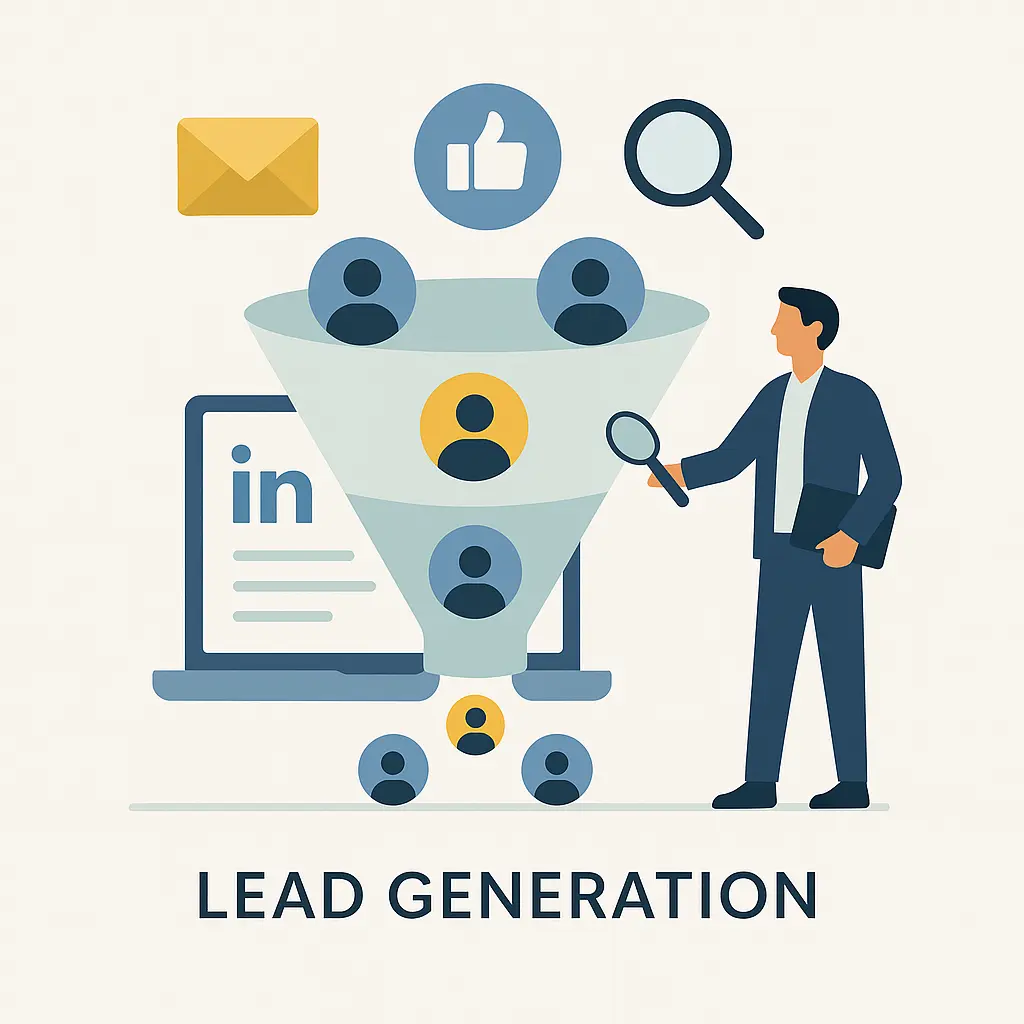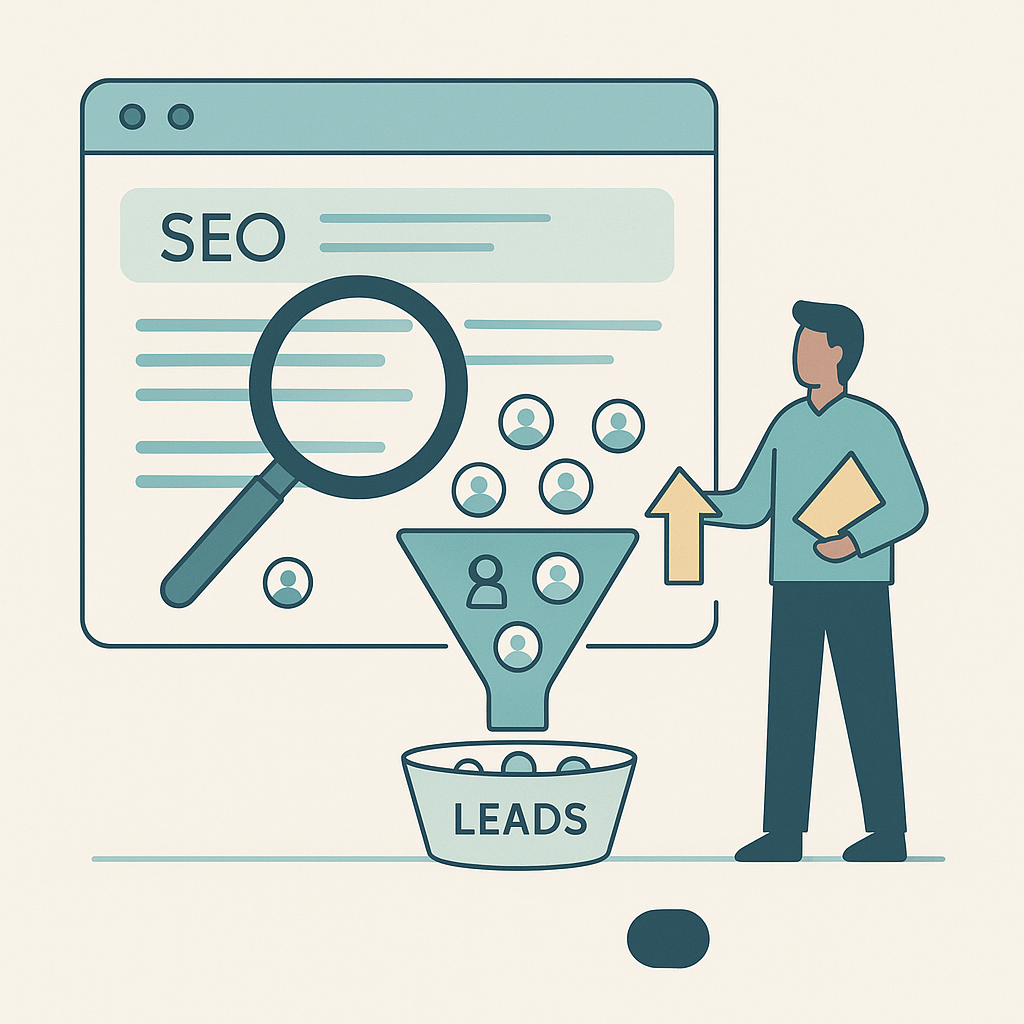What Is Digital Lead Generation?

Digital lead generation means getting and turning potential customers into people who show interest in your company’s product or service. This process is essential for building your customer base and increasing Sales. Digital lead generation is about making a smooth process that changes strangers into potential buyers and potential buyers into loyal customers.
This involves a strategic mix of marketing tactics to:
- Build familiarity with your brand
- Develop trust in your expertise
- Inspire a purchase decision
Why Is Digital Lead Generation Crucial?
- Expanding Reach Beyond Boundaries: In today’s interconnected world, digital lead generation has become indispensable. It allows businesses to reach out to potential customers who are already spending a significant amount of time online. By effectively harnessing digital channels, companies can expand their reach beyond geographical boundaries and tap into a global market.
- Aligning with Business Objectives: Digital lead generation strategies should align with the overall business objectives. To increase brand awareness, boost sales, or enter new markets, good lead generation tactics can help you reach these goals. By synchronizing lead generation efforts with business goals, companies can ensure a more coherent and effective marketing approach.
- Building and Sustaining a Sales Pipeline: Digital lead generation is critical because it helps businesses find potential customers online. With the right strategies, you can reach a vast audience, engage them, and convert them into leads. This process builds your sales pipeline, ensuring you have a steady flow of potential customers.
- Driving Engagement and Trust: Digital platforms offer unparalleled opportunities to connect with diverse audiences. Digital lead generation is different from traditional marketing. It helps businesses reach more potential clients who they might not find otherwise. This expanded reach is crucial for businesses looking to grow and scale.
- Ensuring Long-Term Business Growth: Engagement is a pivotal component of digital lead generation. By interacting with potential leads through tailored content, personalized emails, and social media interactions, businesses can build relationships that nurture trust and encourage conversion. Engaging content that resonates with the audience’s needs and interests is key to successful lead generation.
A well-executed lead generation strategy ensures a steady influx of potential clients into the sales funnel. This not only stabilizes revenue streams but also provides a buffer against market fluctuations. Businesses with a robust sales pipeline are better equipped to forecast sales and make informed strategic decisions.
Website Optimization for Lead Generation

A well-optimized website is the foundation of any successful digital marketing strategy. Here are a few tips to ensure your website is geared toward generating leads:
- Clear Call-to-Action (CTA): Make sure every page on your website has a clear CTA. This helps visitors know what to do next. Use actionable language and design elements that capture attention and inspire clicks.
- Landing Pages: Use dedicated landing pages for your marketing campaigns. These should focus on a specific offer or product to increase conversions. A/B test different elements to determine which versions convert more effectively.
- Lead Capture Forms: Simplify your lead capture forms to increase the likelihood of visitors filling them out. Only ask for essential information. Try different ways to place and design forms to help more people complete them.
Content Marketing Strategies
Content marketing is a strong way to attract and engage potential customers. By creating valuable and relevant content, you can establish authority in your industry and attract prospects. Here are some content marketing techniques:
- Blog Posts: Write informative blog posts that address the pain points of your target audience. This will help draw organic traffic to your site. Use SEO techniques to ensure your content is discoverable by search engines.
- E-books and Whitepapers: Offer downloadable content that provides in-depth information on topics of interest to your audience. Promote these resources through email campaigns and social media to maximize reach.
- Videos and Webinars: Create engaging video content or host webinars to interact with your audience and generate leads. Use live Q&A sessions to increase engagement and provide real-time value.
Social Media Lead Generation

Social media platforms offer a great way to connect with potential leads. Here’s how you can leverage social media for lead generation:
- Regular Posting: Share valuable content consistently to keep your audience engaged. Develop a content calendar to ensure a steady stream of posts that maintain audience interest.
- Live Videos: Use live videos to interact with your audience in real-time and answer their questions. This builds a sense of community and offers quick benefits, making it more likely for people to convert.
- Social Media Ads: Utilize targeted ads to reach specific demographics and drive traffic to your landing pages. Use analytics to refine your ad targeting and improve ROI.
SEO for Organic Lead Generation

SEO is crucial for increasing your website’s visibility on search engines. By optimizing your website, you can attract organic traffic, which can be converted into leads. Here are some SEO tips:
- Keyword Research: Use tools like Google Keyword Planner to find keywords that your target audience is searching for. Focus on long-tail keywords that are less competitive but highly relevant.
- On-Page SEO: Optimize your website’s content, meta tags, and images to improve search engine rankings. Ensure your site is mobile-friendly and loads quickly to enhance user experience.
- Backlink Building: Acquire backlinks from reputable websites to boost your site’s authority. Engage in guest blogging and collaborate with industry influencers to gain quality backlinks.
Top Tools for Lead Generation
Several tools can aid in your lead generation efforts. Here are some popular ones:
- Email Marketing Platforms: Email marketing remains one of the most effective lead generation strategies. Tools like Mailchimp and Constant Contact allow you to manage email campaigns, segment your audience, and track results. Create personalized email sequences that cater to different stages of the buyer’s journey.
- CRM Software: CRM software like Salesforce and HubSpot helps you manage your interactions with potential and existing customers. It allows you to track leads, automate follow-ups, and nurture relationships. Use CRM analytics to gain insights into customer behavior and refine your marketing strategies.
- LinkedIn for B2B: LinkedIn is a powerful platform for B2B lead generation. Here’s how you can use it effectively:
- Profile Optimization: Ensure your LinkedIn profile is professional and showcases your expertise. Include keywords in your profile that potential leads might search for.
- Networking: Connect with industry professionals and participate in relevant groups. Share insights and engage in discussions to establish yourself as a thought leader. Tools like Linkify can help you generate post ideas tailored to your audience, keeping your profile active, engaging, and visible to your professional network.
- LinkedIn Ads: Use LinkedIn’s targeted advertising options to reach decision-makers in your industry. Experiment with different ad formats to determine which yields the best results.
Building Your Lead Generation Strategy

A good lead generation strategy uses different methods and requires regular improvement. Here’s how to create an effective strategy:
- Know Your Audience: Knowing your target audience is the first step in any lead generation strategy. Define their demographics, interests, and pain points to tailor your marketing efforts effectively. Use customer personas to guide your content creation and promotional strategies.
- Set Clear Goals: Outline what you want to achieve with your lead generation efforts. Whether it’s increasing website traffic or boosting sales, having clear goals will guide your strategy. Set measurable objectives and use KPIs to track your progress.
- Measure & Optimize: Regularly analyze your lead generation efforts to identify what’s working and what needs improvement. Use analytics tools to track performance and make data-driven decisions. Continuously test and refine your strategies to optimize lead conversion rates.
Effective digital marketing lead generation is about using the right strategies and tools to attract and convert potential customers. By optimizing your website, engaging in content marketing, leveraging social media, and utilizing lead generation tools, you can create a robust lead generation strategy. Remember to continually analyze and refine your approach to ensure long-term success. Using these methods will help you get more leads and create a strong base for ongoing business growth. By remaining adaptable and open to new strategies, businesses can thrive in the ever-evolving digital landscape.
